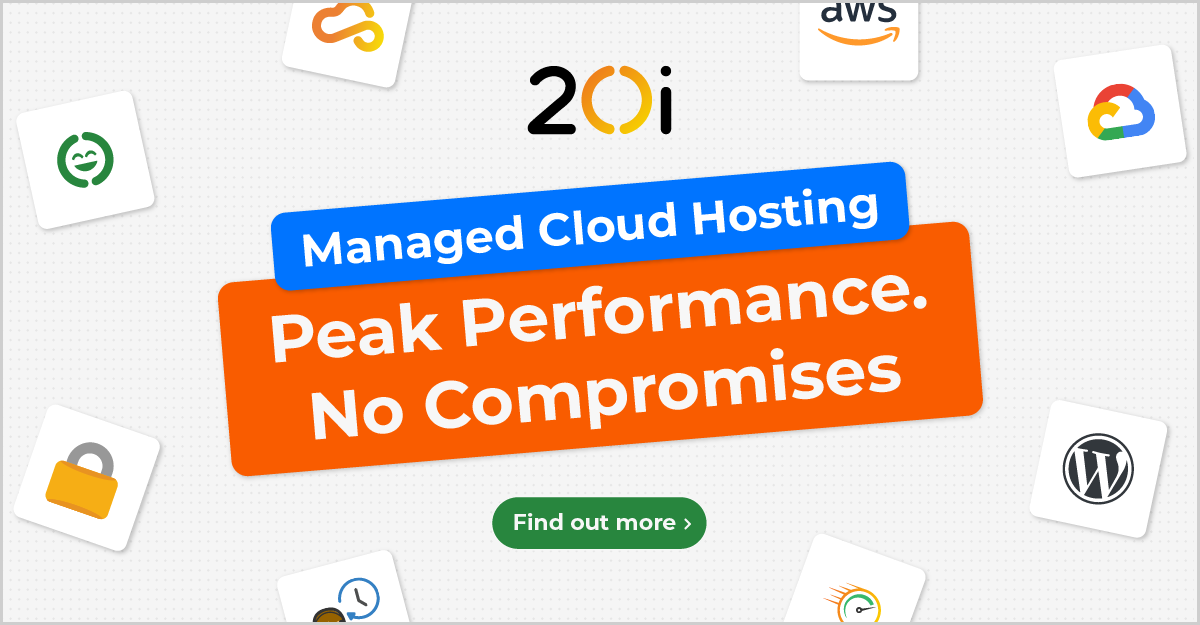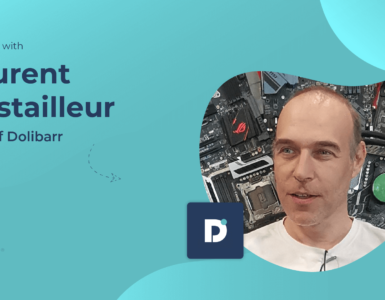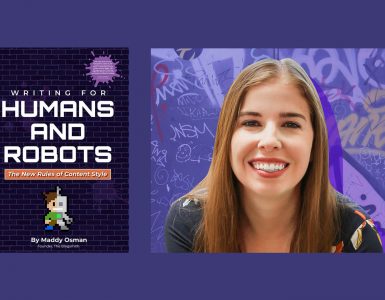Dixon Jones is CEO of award-winning SEO software Inlinks, and a respected voice within the SEO community.

Dixon is a regular speaker at large events such as BrightonSEO, TedX, and Search Marketing Expo.
Dixon was kind enough to speak to us about:
- How he got started in SEO
- What his thoughts are on the future of SEO,
- What the recent Google leak can tell us
- His advice for successful SEO
- Why entity SEO is so important
- … and much more!
Hi Dixon, thanks so much for taking the time to speak with us. Can you explain a little bit about how you got started in the web industry?
Hi, 20i, thanks very much for having me. How did I get started in the industry?
Well, back in the 1990s I used to write and run murder mystery evenings for a living.
I had a business called Initiative Unlimited – It’s still going today although I don’t have anything to do with it – and I used to write and run murder mystery evenings.
Then the Internet came along, so I thought I better build a website!
I bought FrontPage 1995, that didn’t work. Then FrontPage 1997, I managed to get to work, and I built a website. And I put it online.

I looked at my log files, and I saw that people were coming to my website from places I could never get to; Ohio springs to mind.
So, then I worked out how I might write a downloadable version of the product, and I started to learn about SEO and why people were coming into my site from Ohio, and that’s how it all started for me.
Murder mystery evenings to SEO is quite the journey! So, fast forward a few years and you’re now CEO of Inlinks – how would you best describe Inlinks to someone who isn’t familiar?
So, in Inlinks is a search engine optimisation SaaS technology. It’s a web-based technology, and it improves your content.
It improves the structure of your site, and it internally links all the concepts together. It does that by, firstly, building a database of objects, of topics and entities that you’re talking about on the website.
So, it gets a crystal-clear idea of the objects on your website, the things you’re talking about.
And then, with you as a human in the loop, it can use that to focus where your authority is for any topic onto one page.
It does that through some interesting schema markup. It also does it through automating your internal links or semi-automating because you must set the targets.
It then helps you to write content, and promote that content because it also has a social media tool where you can start saying “What are the things I need to do to promote this content that I’ve written onto social media?”.
Where did the idea for Inlinks come from?
2 people, really.
I’m not the brains behind Inlinks as much as Fred Laurent is, who’s the CTO and also a slightly larger shareholder than I am.
He’s a French guy, and he started looking at entities the same time as I did.
I was looking from a marketing perspective though, and was talking about entities, particularly when Freebase and Metaweb were bought out by Google. I was talking about it at things like Pubcon, so 2014/15 onwards.

At the same sort of time, Fred was working out how entities could be used in everyday life.
Eventually, we met up and took the ideas that he built the final mile to help him to put them into a search engine optimisation product.
How did you go about building Inlinks to where it is today?
My mantra in running a SaaS company is to make sure that your CTO has more shares than you do.
And the reason I say that is because if you’re going to build out a product, the main engineer is so important to that business that you can’t afford for that person to leave.
You’re going to need key personnel insurance, which we have anyway.
It’s going to be very hard to find another person that has the same passion for the same project as the original lead.
So that person has to have a vested interest forever!
So, our joint venture agreement, suffice to say, is really one way. Fred is in the driver’s seat. I’m just the CEO and the marketing face of the end of the product.
You focus on the term entity SEO, something other SEO tools often overlook. How do you describe entity SEO, and why is it important?
I wrote a book called entity SEO, which answers that question in a lot of detail, and you can get it on Amazon, and please do.
But really, it’s important because entities are the glue that sticks ideas together.
The difference between a keyword and a topic and an entity is subtle but important. When it comes to keywords, all the words in the world are keywords and any topic can be labelled with a bunch of keywords.
But it doesn’t necessarily mean that it’s an entity.

An entity is a concept in a database with an ID number. So, it means that if you can describe your content on your web page or describe your business or describe the things that you’re doing in entities, then you can structure that information to always point back to one definition of an entity.
Something like the Eiffel Tower can be the Eiffel Tower, or it could be “La tour Eiffel”, or it could be described as “that big metal thing in Paris”, or it could be whatever Azerbaijani is for Eiffel Tower.
They’re all very different labels, but they all refer to the same well recognised entity.
It’s only an entity when it appears in a database, say, Wikipedia or the Oxford English Dictionary or Freebase or Google’s Knowledge Graph.
Any of these are semi structured datasets, and they make it much easier to connect the world of ideas together.
So, if you don’t start thinking around entities, you’re going to be screwed in the end. It’s just a case of when.
So that’s why.
With the nonstop changes in the SEO industry, how do you ensure Inlinks stays relevant to users?
Well, entities are the start of that.
Ever since Google bought Freebase, they started to think about their world in terms of entities.
And if you lift the lid on the latest Google leak you’ll see that even more.
I have a searchable database of the leak on dixonjones.com, you’ll see that the idea of keywords is used, 30 – 40 times in the leak, and the concept of entities used is used hundreds of times; 500 times or something like that in the leak.
I can’t remember the exact numbers. Now even if Google disappears tomorrow, technology still needs to sort of talk to each other.
So, whether your marketing is in images, whether your marketing is in video, whether it’s in web content, whether it’s in social media content, whether it’s banners on the top of skyscrapers, all these things eventually are talking to each other.
And if you want to connect those dots, an efficient way to do it is to bring everything down to the underlying entities because you can then do it with a few numbers, basically.
Three numbers pretty much describe the content of a picture or a web page. So, that gives you a language familiarity between content mediums and between natural language and actual languages.
So, it becomes a very powerful way to model the future and your marketing.
If you want to be in the driving seat, understanding entities is worth the risk. Of course, you don’t have to understand everything, but it helps to have tools that thought about this for you, so you don’t have to.
You touched on it a little there, but what are your general thoughts on the Google API leak? Any major changes from it or is it business as usual?
Have I changed my methodology? No. Not a lot.
I am waiting to see more about how that information is understood and interpreted. Obviously, Google has said the only things that they’re going to say about it.
I think it is interesting to be able to search the database and see how much everything is talked about and used – and concepts, like keywords, like images, whatever it may be.
Just put a word into the search box and you can start to see how important it is just based on the number of times it’s used in the APIs.
What advice would you give to someone looking to ramp up their SEO?
Well, it really depends on where your starting point is, to be honest with you. I think that there are a dozen things that you should do right out of the box.
You know, there’s some of the very simple ones such as see what Google Search Console tells you.
It’s a sensible thing to do. Another is to make sure you’re on Google My Business, which is especially important if you’re a local or regional business.
But if you’re trying to get out the gates, you need to first fix what I call the “hygiene factors”.
Those problems are ones generally that stop you being indexed or make your site so slow that it’s affecting users, and I think that that’s place number 1 to go.
Once you’ve got that, then, I think the most significant thing you can think about is topic clustering.
In that, a lot of people will write 1 page on any keyword, then move on, or, alternatively, they won’t understand the idea of topic clustering.

Image source: https://www.semrush.com/blog/topic-clusters
Topic clustering says, look, if you want to be an expert in, blue pills, then you could write one page on blue pills, or you could have a whole website on blue pills.
Somewhere in between, you need a cluster. You need to sort of say, well, to demonstrate that I know enough about blue pills, I’ve got to talk about blue pills enough and in an authoritative way so that there is a hub of information about blue pills; not just one web page.
And you do that by making sure that everything’s closely linked together within the concept of blue pills.
So those pages could be spread all over your website, but when you start talking about blue pills meaningfully, they should link to the blue pills web page. And that will give you authority over specific topics.
And finally, for a bit of fun, if you had an unlimited SEO budget, what’s the first thing you would do?
If I had an unlimited SEO budget, I’d cash in and retire and go away, take the money and not spend it!
Assuming that’s not what I’m allowed to do, I think that I would probably hire 2 or 3 good consultancies or agencies working in parallel and arguing the meritocracy of their techniques.
I think what happens a lot is that people, including myself in the past, often work on emotion and without substance to their decision-making process.
So what one SEO may agree with, another SEO may not. If I had 3 SEOs advising me, then I could go and have a look at all three opinions.
And if 2 were a bit like, minority report, I can decide whether to go with them or not. So that might be a good place to start.
Fantastic idea! Thanks again for your time, before you go, where can people go to follow you or get in touch?
Well, if you’re interested in my SaaS technology, please, of course, go to inlinks.com and sign up for a demo – or just sign up!
If you want to know me, dixonjones.com is my website, and there’s an about page there with all my social media profiles.
Thanks very much for having me again, 20i.








Add comment